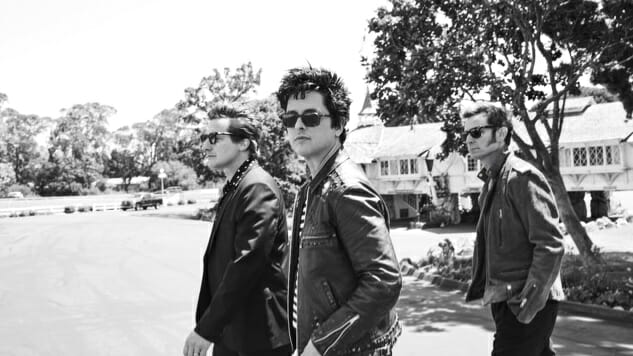Why Green Day Will Always Matter to the Young and Uncool
Photo by Scott Nagelberg (Crush Music)
If your uncle was deemed a “drunk” and not the more refined-sounding “alcoholic,” Green Day probably meant something to you. If most of your clothes used to be someone else’s, or your parents’ bank was inside of a Walmart, or your favorite toys came from Odd Lots, Green Day probably meant something to you. If you ever ate Dinty Moore in front of a television, Green Day probably meant something to you.
“I declare I don’t care no more,” Billie Joe Armstrong shouts in the first line of “Burnout,” the opening track to 1994’s Dookie. That Dookie managed to be the smash hit that it was seems more and more surprising as years go by. Listening to rock radio in 2016, awash in nature-loving bearded men who lament over a banjo that love is, man, hard, the grimy class-conscious specificity and shrugged off shamelessness of Dookie’s singles sound even more distant and unusual.
You have “Longview” with its lazy eye roll of a bass line and the actual word “masturbation.” There’s “Basket Case,” which documents Armstrong’s struggles with anxiety with surprising specificity and wry, sharp humor (“Sometimes my mind plays tricks on me”) and alludes to his bisexuality with a sex-positive, pronoun-switching reference to a prostitute. And then there’s “Welcome to Paradise,” which furiously exerts its independence and urges the listener to “pay attention to the cracked streets and the broken homes,” not as some sort of charity, but because, hey, actually “some call it slums, some call it nice.”
Imagine kids hearing any of those short, puerile singles on the radio sandwiched between, say, Stone Temple Pilots and Pearl Jam. Those songs went there because there was nowhere else to go. It’s where they were.
Bratty and vulnerable, young Armstrong sings like a teen—like a kid, really, especially earnest when he puts on the faux-British accent inspired by his many punk idols. It’s common to talk about the divide between pre-and post-Y2K youth, but in many ways it really was harder to grow up before the internet and Tumblr—before you knew how your life and your personality stacked up against those around the world. It was easier to dig into the dirty realities of your own inconsequence, and it was also easier to claw your way into unselfconscious, low-stakes declarations of your own significance. Easier to see you don’t matter, more vital to find DIY ways to disagree.
Dookie is the sound of kids kicking rocks and yelling and not giving up. Dookie is teenagers making themselves heard. Dookie is the same reason I write.
There’s an accepted narrative that, after Dookie, all of Green Day’s work has, to some degree or another, been a “selling out”—a decline into self-seriousness and mediocrity. But even with shined-up production and designer pinstripes, Green Day has always at its core remained sincere and uncool in ways that never abandoned the teenagers they used to be—nor do they abandon the teenagers who still connect to their music.
Much of their 1995 follow-up Insomniac delved into Armstrong’s struggles with self-esteem, addiction and panic disorder. On “Geek Stink Breath,” he calls methamphetamines a “slow progression, killing my complexion and rotting out my teeth,” and exclaims “I don’t know what I want / And it’s all that I’ve got / And I’m picking scabs off my face.” That’s so gross, and also raw and direct and honest and ugly, and all of those things are what you need to be allowed to feel and relate to when you’re young and exploding with awkwardness and rage and pus.
1997’s Nimrod showcased grim bitterness but also featured the band’s most romantic songs since the youthful panicked lovesickness of much of their second album, Kerplunk! Note that Green Day doesn’t traffic in beautiful, elegant, tragic romance. Theirs is bald-faced, embarrassed, what-the-hell-am-I-doing, “where do we go from here and what did you do with the directions,” romance. It’s too real and too imperfect, and yet perfectly melodic in a way that, when you’re a lost kid with a bad home life and a crush that will never notice you behind your braces, can seem lifesaving.
-

-

-

-

-

-

-

-

-

-

-

-

-

-

-

-

-

-

-

-

-

-

-

-

-

-

-

-

-

-

-

-

-

-

-

-

-

-

-

-








































